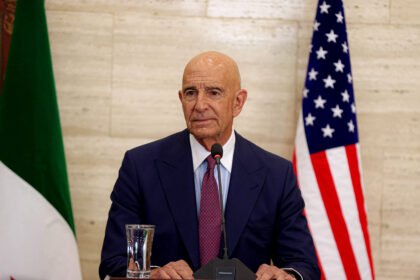SINGAPORE/NEW YORK – U.S. authorities have secretly placed location-tracking devices in targeted shipments of advanced chips they believe are at high risk of illegal diversion to China, according to two people with direct knowledge of this previously unreported law enforcement tactic.
These measures aim to detect the diversion of AI chips to destinations subject to US export restrictions, and only apply to selected shipments under investigation, the people said.
These statements demonstrate the extent to which the United States has imposed restrictions on chip exports to China, even as the Trump administration seeks to ease some restrictions on China’s access to advanced American semiconductors.
The people, who declined to be identified due to the sensitivity of the case, said the tracking tools could help build cases against people and companies that profit from violating US export controls.
Site trackers are an outdated investigative tool used by US law enforcement agencies to track products subject to export restrictions, such as aircraft parts. These devices have been used in recent years to combat illegal semiconductor conversion, according to one source.
Five other people actively involved in the AI server supply chain say they are familiar with the use of tracking tools in server shipments from manufacturers such as Dell and Super Micro (SMCI.O), which include chips from Nvidia (.O)
These people reported that trackers are usually hidden in server shipment packages. They did not know the parties involved in its installation, nor its location along the shipping route.
The United States imposed restrictions on the sale of high-end chips from Nvidia, AMD and other manufacturers to China in 2022.
In one 2024 case described by two people involved in the server supply chain, a shipment of Dell servers with Nvidia chips included large trackers on shipping boxes and smaller, more discreet devices hidden inside the package – and even inside the servers themselves.
A third person said he saw photos and videos of tracking devices being removed by other chip vendors from Dell and Super Micro servers. He added that some of the larger trackers were about the size of a smartphone.
The sources said that the US Department of Commerce’s Office of Industry and Security, which oversees export controls and enforcement, is typically involved in this process, and Homeland Security and FBI investigations may also be involved.
Super Micro said in a statement that it does not disclose its “security practices and policies to protect its global operations, partners and customers”. She declined to comment on any tracking actions by US authorities.
Dell said it was “not aware of the US government’s initiative to place tracking devices in shipments of its products”.
Slide restrictions
The United States, which dominates the global AI chip supply chain, has sought to limit exports of chips and other technologies to China in recent years to curb its military modernization. It also imposed restrictions on the sale of chips to Russia to undermine war efforts against Ukraine.
The White House and both houses of Congress have proposed requiring US chip companies to include location verification technology with their chips to prevent them from being diverted to countries where US export regulations restrict sales.
China has strongly criticized US export restrictions, seeing them as part of a campaign to suppress its rise, and criticized the location tracking proposal.
Last month, the country’s powerful cyberspace regulator summoned Nvidia to a meeting to express concerns about the risks of its chips containing “security vulnerabilities” that allow remote access or control, which the company strongly denied.
In January, Reuters reported that the United States had tracked an organized smuggling of AI chips into China via countries such as Malaysia and Singapore.
The use of tracking devices by US law enforcement dates back decades. In 1985, Hughes Aircraft shipped equipment subject to US export controls, according to a court ruling reviewed by Reuters. The decision indicated that the US Customs Service, in implementation of a search warrant, intercepted the shipment at Houston Airport and installed a tracking device.

















